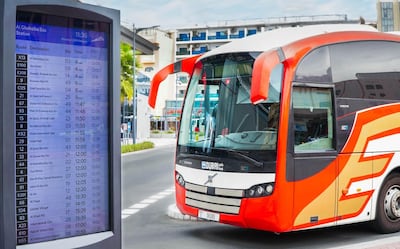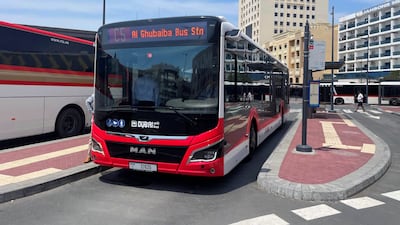Dubai on Sunday set out plans to introduce 636 more buses to its public transport fleet under a Dh1.1 billion strategy designed to take cars off the road and boost the environment.
The Roads and Transport Authority announced the purchase of 450 city service buses, featuring low floors for easy access for disabled people and special seating for children, 146 articulated and double-decker buses for high-density areas and 40 electric buses.
They will be delivered throughout the remainder of 2024 and into 2025.
“The procurement of these new buses is part of a master plan to elevate the public transport system in Dubai to bring it in line with the top international standards,” said Mattar Al Tayer, director general of the RTA.

“Our goal is to offer best-in-class services to public transport users and accommodate the sustained growth of public bus ridership.
“The deal illustrates RTA’s determination to make public transport the preferred mobility mode for residents to increase the share of public transport journeys to 25 per cent by 2030.
“Achieving such a target requires the provision of high-quality public transport means characterised by wide geographical coverage and integrated multi-modal transit systems.”
The RTA aims to convert all buses, taxis, and limousines to zero-emission vehicles, seeking 100 per cent conversion of public transport buses to electric and hydrogen-power by 2050.
The contract includes 40 electric buses from Chinese firm Zhongtong, built to Gulf specification tested and proven in the region, and 450 city service buses, including 400 Man buses and 50 Zhongtong buses, all with high safety and comfort.
Greener travel
The buses are fitted with Euro 6 environmentally friendly engines and classified under the United Nations Vehicle Category Class II, allowing flexibility in operation on urban and inter-urban routes.
The contract also includes 76 double-decker buses from Volvo and 70 articulated buses from Isuzu Anadolu to serve high-density urban areas and new districts, enhancing geographic coverage and increasing occupancy rates.
Most of the buses will be equipped with the Driver Behaviour Monitoring System (Raqeeb), to monitor and improve driver conduct.
The system utilises innovative technologies that enhance bus safety standards, and features an Automated Passenger Counting (APC) system and automated fare collections.
Buses will also be fitted with bike racks to encourage further use of greener travel from home, on board Wi-Fi and mobile phone charging points.
It is hoped high quality public transport operating between more urban areas all encourage more people to use buses in preference to their cars.
“The RTA is a pioneer across the GCC in developing a special fuel consumption testing system (UAE Fuel Consumption Protocol) to compare fuel consumption among different bus types,” said Ahmed Hashim Bahrozyan, chief executive of the RTA's Public Transport Agency.
“The supplier qualification criteria included the ability to manufacture, supply, and maintain buses to global standards to enhance financial and environmental sustainability principles and ensure operational efficiency.”


